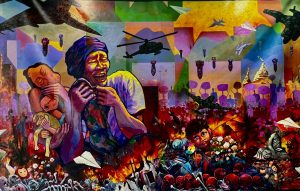From kickboxing rings to beer halls and community art centers, the civilians and soldiers who have left war-torn Myanmar are leaving their mark on Thailand, where the latest estimates say that at least 2 million people have found safety from a conflict now in its fourth year.
Among them is Vero Nika, a kickboxer from Kayin (Karen) State in Myanmar’s southwest, who carries her ethnic Karen flag with pride into the ring and has found fame as the top female fighter in the World Muay Thai Organization, since arriving in Bangkok two years ago.
Like other Myanmar fighters, Nika has found an edge and is considered tougher than her Thai competition. She was schooled in lethwei – a homegrown mixed martial art – a brutal sport which unlike Muay Thai does not use protective gloves, and in which head butts are allowed.
Her skills are as sharp as her attitude towards the conflict back home.
“I didn’t think things would go this wrong after the coup,” she told the local media after her 25th win in October 2022. “I couldn’t help crying whenever I see reports of the killings. And I could do nothing else except feel sorry for them. I want to defeat the dictatorship and support those fighting it.”
Nika is a media knockout with Myanmar’s press-in-exile and has served as an inspiration for compatriots who are struggling to make ends meet in Thailand. Some have taken jobs in construction, or at bars and as telecoms operators; others have established traditional Burmese tea houses and art galleries.
A New Burma is a collective run by exiled activists who smuggled art and anti-regime war propaganda across Myanmar’s porous borders into Thailand where they are currently being used to remind the outside world of the PTSD suffered by the country’s children.
“When We See The Planes” is a telling community exhibition emulating the sounds and visuals of Russian-made jets and the horrors they have caused since the military seized power from an elected government in early 2021.
“The airstrikes contain you every day and every night and everyone is concerned,” Dr. Si Thu Aung, a medical doctor, told The Diplomat after the exhibition’s launch at the Foreign Correspondents Club of Thailand in June.
The 25-year-old spent a year-and-a-half treating the war wounded, including “kids who have been amputated because of landmines and the same amount of kids due to airstrikes.”
“Early childhood trauma is the worst because they have to live for a long time – unlike us – so we have to provide essential mental health rehabilitation programs,” Si Thu Aung said, adding that medical supplies are limited and support for psychosocial issues almost non-existent.
Bangkok is also attracting commandos on leave from service in various anti-regime forces. One sniper described how his platoon had run a teahouse in Mae Sot, the Thai town bordering Kayin State, “to eat cheap, make money, and buy guns,” but that there were too many issues with the local police.
“Police and immigration follow us all the time, even when we’re legal, so we’ve moved our teahouse to Bangkok where we can disappear into a suburb on the edge of the city,” he said. “We can go to the kickboxing and buy what’s needed to be sent back across the border.”
That included school books, clothes and medicine, which he said with an air of confidence would be delivered by his comrades in arms. But not all who left are as successful, dedicated or as confident as Nika, Si Thu Aung, or the commandos.
Twenty-three-year-old Ri perhaps best reflected what life is like for most who fled Myanmar and are struggling. She didn’t want to come here but she decided it was the best option for completing her studies in botany, although she’s yet to be granted an elusive student visa.
Between serving drinks at a bar in Bangkok’s notorious Sukhumvit Soi 4, she says she wants the war to be over. She wants to go home. She wants to give her brothers and sisters a hug, but she needs to work and send money back instead, so her family can eat.
Ri said that her life before the coup was good and added in halting English that “back then there was light.” But when pressed about life in Myanmar and the darker days under the junta, she snapped, “Who are you? The police?” and walked away.

































